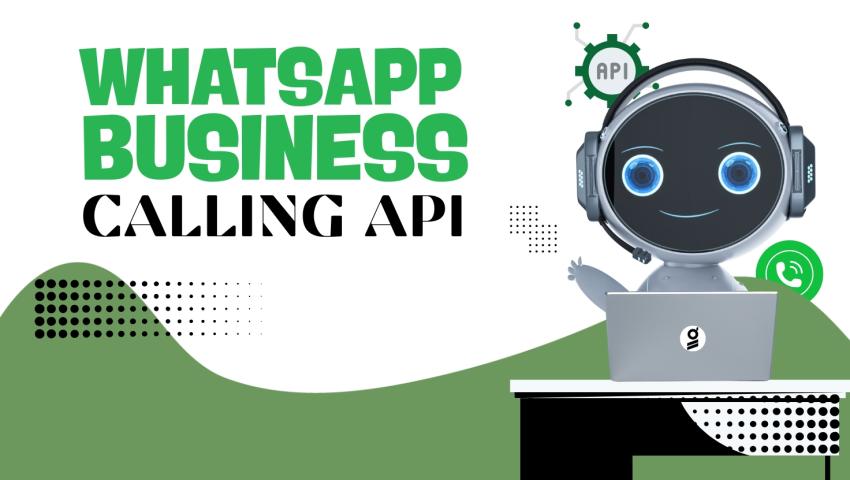
WhatsApp Business Calling API For Better Customer Engagement
WhatsApp Business Calling API enables a business to make and receive voice calls with their customer via WhatsApp. It facilitates communication to the level that customer service systems have been able to integrate voice support making the communication flow more effectively and in real time. The comprehension of this API implies understanding that it helps to provide customers with a better experience and shorter response time, as well as a more personal and convenient method of communication.
- An API allows calls to be made through VoIP as part of the Cloud API version of the WhatsApp Business.
- Facilitates both customer-dialed and business-dialed voice communications, the former with no cost for receiving calls, the latter with consent, with an opt-in permission process.
Why It Is Important
- Customer Journey One-App
Chatter brings all messages, calls, and threads under one roof- there is no longer a switch in context with channels.
- Increased User Experience
The convenience of a seamless transition between chat and Voice support to bring greater clarity to critical queries is identified to be expected by an average of about 76 percent of consumers.
- Trust & Verification
Business accounts presenting the brand (logo, name, blue tick) are more trusted by the users and result in fewer calls being rejected.
- Secure & Encrypted
This forms end-to-end encrypted communications based on WebRTC that are privacy-friendly and compliant with regulations.
- Operational Efficiency
Call handling is done through permissions, IVR support, call icons and business-hours controls- making work more efficient.
Key Features at a Glance
- Customer-initiated calls: Customers will be able to tap the Call button. It is open to all.
- Business-initiated types of calls: Businesses have to seek authorisation to make calls. Their calling frequency is once in 24 hours or twice in 7 days only. It is justified for emergency cases.
- Unified Threading: Messages, chats, and calls will remain in one history or stream.
- Security: Calls are secured by encryption and WebRTC. All things are done safely in the secure system of WhatsApp.
- Control: Companies are able to specify the time calls can be taken. They are also able to make templates, deep links, and IVR menus.
It is first on location in India, Brazil, Mexico and Indonesia: global and branded. It is soon going to spread to other nations.
Real Life Use Cases
- Lead Conversion: Timely response through hot prospects calls via chat and speeding up sales.
- Customer Support Escalation: In complicated matters, discontinue using texts and switch to using voice to address issues in real time.
- Service: Book a maintenance or call to have the issues fixed using WhatsApp secure calls
- Urgent Alerts: Voice updates in real-time, conversational updates via voice on your order status, appointment confirmation, or emergency information, and everything is contextually threaded.
How to Set it Up: Step‑by-Step
- Check Eligibility
Should use WhatsApp Business Platform and have 1000+ business-initiated conversations within 24 h, as well as work in a supported market.
- Apply Access & Verification
Make sure that your Business Manager and WhatsApp Business ID are confirmed; blue tick confirmation is highly advisable.
- Build API Logic
Outbound consent: use permission templates; use WebRTC and IVR. Meta has extensive developer documentation and SDK examples.
- Train your Team
Arm the agents with the best practices in call handling, escalation, and follow-up.
- Pilot & Monitor
Open with small volumes; monitor the statistics such as the rate of successful calls, queuing time, abandonment, and customer satisfaction rating.
Best Practices
- Limit your use of permission requests to within opt-in requirements.
- Maintain professional and branded call flows as a way of maintaining customer trust.
- Track call KPIs and provide feedback frequently.
- Adhere to business hours, and make calls when it is not busy.
- Be more or less in line with the WhatsApp policies- do not spam and do not call unwanted people.
Not to be overlooked & Outlook.
- Rollout is worldwide first, region by region, and India is one of the first markets.
- Meta is experimenting with voice AI agents, mainly virtual assistants, which is probably next.
- Face time support suggested during Meta events, Business support also may soon include face-to-face virtual customer support.
Final Thoughts
WhatsApp Business Calling API, offered by Meta, fills a gap between the text and voice experience, bringing more faceted experiences to customers, as well as speeding up the process and increasing trust since calls can be identified as authorized and safe. Having access to communication that is centralized within WhatsApp enables businesses to scale support as well as sales, engaging more in context. When you are willing to enhance your customer experience, incorporate a calling partner with a BSP, get certified, train your staff, and introduce pilots. Convenience, human touch provided on top of regular interactions, can make the latter loyalty-creating activities.
